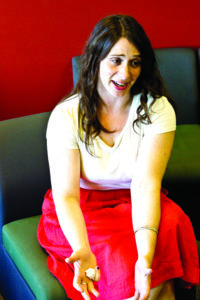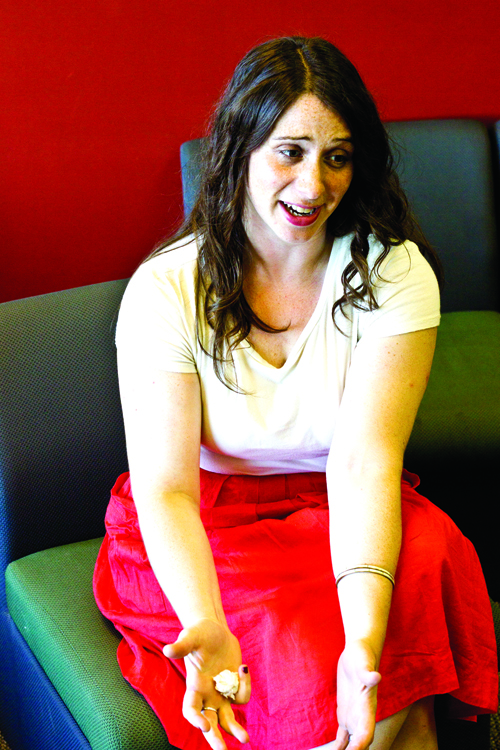Author and T.A. Samantha Bernstein comments on the hipocrisy of the baby boom generation
Alex Hum
Features Editor

Samantha Bernstein, a Ph.D student at York, sat down with me last week to talk about her book, Here We Are Among The Living, released over the summer. The book is a memoir of her 20s, written in the form of emails between her and her friends.
Excalibur: How would you describe the story you’re telling in the book?
Samantha: It’s an intergenerational story about the children of baby boomers trying to come to terms with the world after boomer idealism. So many people in my generation grew up listening to the music that our parents listened to and believing in the things they believed in, but it was a really messed up world, and so, there’s a lot of anger and frustration.
E: Give me a brief timeline of events and characters that show up: who are they, where did they come from, and what kind of experiences did you have from them?
S: The mother-daughter relationship is pretty key. I grew up the only child of a single parent, so we were tight on money. She worked in the film industry, a brutal industry. She had a lot of health problems, and she had been a hippie. I grew up with all her old clothes and all her old records, and she did stay quite true to her values.
Something I heard a lot about growing up was when her friends would lie to their children about smoking pot, saying they never smoked pot, and they still don’t smoke pot; meanwhile, they had a stash in their drawer. She never lied about that stuff, and she always thought it was abhorrent that they lied about it.
E: How did she feel about this hypocrisy coming from her own generation?
S: She would often say, ‘What has happened to my generation? Why have we betrayed all of these ideals? Why are we voting Republican? Bush was elected twice, what’s wrong with them?’
A lot of the mother-child stuff is looking at what happened to the baby boomers, who as a group, stayed true to many of their ideals, but also, in a lot of other ways, didn’t. For example, she was always wishing she had more money, but in the ‘60s she said she was going to renounce materialism. What happened to that ideology? Now you want to live in a fancy mansion… Make up your mind!
E: Between the baby boomers and their children, how do the two generations both appear in the book? Are they on parallel paths? What happens to the gap between them?
S: There’s a lot of interaction between the two generations. It’s really about those two generations trying to negotiate some kind of relationship. I would say that it starts off as the younger generation being angry towards the baby boomers and expressing a lot of rage, and it moves towards a kind of resolution and forgiveness as they get older.
E: What kind of tensions are there between the two generations?
S: A sense on the younger generation’s behalf that the older generation are hypocrites. For example, watching car commercials with songs that were part of the 1960s counter-culture, and recognizing there are other commodifications of this movement that was meant to be about individuality.
More than that, it was about a resistance to cultural expectations of wealth, professionalization, and success as defined in a certain way. As soon as punk style became something you could buy in a mall, when you could go to the mall and buy a safety pin for your ear, we all knew that counter-culture was done. The very possibility of it has been annihilated.
E: How did your generation feel about the loss of that ideology?
S: When I was 21, I wanted to blame somebody, and I said, ‘Well it was you baby boomers, it was you, because you had this great counter-culture, and then you just went ahead and sold it!’
The commodification of counter culture started in the ‘70s. Have you ever seen Withnail & I? It’s kind of great, it’s worth the couple of hours to watch it. It’s old now, but there’s this great line where this super drugged-out drug dealer in England on the cusp of 1970 says, ‘They’re selling hippie wigs in Woolworths, man. The greatest decade in history is over.’
So I think people knew it was going to happen. I don’t think it became a widespread thing until even after grunge, after alternative music just became a section of the record store that you go to. That’s what really did it.
E: How did your own life translate into the book? How did you put yourself into the middle of it?
S: As I was growing up in my early 20s around the turn of the millenium, it just seemed like what we were experiencing was what a lot of other young people were experiencing. I wanted to document a lot of the conversations we were having, the love affairs we were having, and the political engagements we were doing, because a lot of people were doing that kind of stuff.
This was the group of people that was right in front of me, and so, I wanted to capture it. I wanted to be honest about the fact that it was us. I felt that we would serve just as good an example for people of our class and background as anybody else, so I thought why not have it just be us?
E: What is your own character like? How do you present her in relation to the outside world?
S: My character is very insecure in some ways about her talent, about her abilities, and about her relationship with her father because it’s a confusing thing, so trying to find some clarity in the middle of all that.
E: And everything is really true and pertinent to the life you were living?
S: Yeah, it all happened. It may not have happened in the exact order I said it happened, but it pretty much did.
E: Obviously this means a lot to you, but when did you start to think about this political hypocrisy? Did it stem from your relationship with your mom and everything that she left you with? It sounds like everyone around you was participating in this consumer culture except her.
S: But she did.
E: Is this book a way for you to try to explain that?
S: Probably. I think a lot of the psychological drive honestly did come from living with somebody who was constantly dissatisfied with her economic position, and having no awareness of how contradictory that was to the kinds of values she had as a younger person.
When I started to learn about what was going on in the world, I was so horrified. But I soon realized that it was entirely likely all of that horror was all just an aesthetic dance. I was so terrified because maybe I wasn’t what I thought I was.
When you’re in your early 20s, you think, ‘I’m this guy, and this is the guy that I am,’ and it’s great because you’re not in that horrible, awkward, and amorphous moment of being a teenager anymore. Then you realize you’re not as solid as you think you are, and it’s difficult trying to figure out the causes that lead people to betray their own ideals.
E: What’s the philosophy behind the book? What kinds of issues are you addressing?
S: Political hypocrisy. The central question is how to live an ethical life because I think we’re always trying to do that, but especially for middle class North-Americans, it’s really hard to live an ethical life. Impossible, in fact. It’s about trying to make peace with how impossible it is, and trying to do our best to live as ethically as we can.
E: What do you want people to take away from the book?
S: I would say the overarching philosophy in the book is we’re all in this together. So it’s not about me saying that I’ve figured out the key to getting outside of consumerism. There is no outside, and that’s the problem.
So my hope would be that people realize it and be willing to question their own counter-cultural affiliations, what it means to them, and how they express it. If somebody is passionately attached to being able to use all these signifiers to display their affiliations but those signifiers are purchased through some massive corporation, that is an unavoidable hypocrisy of modern life, but we’re better off if we’re aware of it.
E: Lastly, let’s talk about your father, the poet, Irving Layton. What kind of role did he play in the book?
S: He’s a big figure. He kind of provides a frame for the book because it starts with us going to Montreal to this tribute for him. I go with Michael Bobbie who becomes the love interest.
The rest of the book is centred around this romance. We’re just friends at the time and then it becomes more than friends. After a two-year break, after we’ve broken up, he and I go to Montreal again to see my dad in an old folks’ home, and he’s got Alzheimer’s. Then, at the end of the book, he dies, and Michael Bobbie proposes, so that’s the frame of the book.
E: What was it like having Irving Layton as a father?
S: It was a little strange. I grew up in a marginal position in a very affluent neighbourhood. I lived where my mom had grown up. It was already weird because I only had one parent. I remember this classmate in grade three whose parents were psychotically overprotective, and they told their kid not to hang out with me because I might have emotional problems because I had only one parent. This was the ‘80s, so it wasn’t that normal yet.
I always knew that I was different. If I grew up in a different neighbourhood, that might not have been so pronounced, but where I was, it was very obvious. To me, it always led to the fact that my father was a poet.
I thought to myself, ‘I don’t have a father because he’s a poet.’ Somehow, the poetry had taken precedence. One of the stories I tell in the book is when he called when I was nine, wanting to establish this relationship because he lost all custody.
He called when I was nine, and he wanted us to see each other, and I basically told him, ‘You fucked it up,’ in nine-year-old speak. So I said, no, which I subsequently regretted, but you don’t know anything when you’re nine. He seemed to me, in my child mind, to be this very bombastic, powerful, overpowering character.
E: Did the book help you learn about your father and connect you to him in any way?
S: At the end of the book, there’s a poem. I read a poem because he died, and I say something like, ‘Don’t worry father, you’ve initiated me into the customs of our tribe’ because when somebody dies you have to make funeral arrangements and you have to go. There is this protocol you have to follow, and it’s so formal. It’s a very unemotional way of processing this crazy thing. But this was something he had given me.
Even though I never really knew him, I was still involved in, for example, where he was going to be buried. For some reason, I had a say in this, so there was a sense that, he’s my father, and as my father, there are certain things that he’s going to teach me about life.


